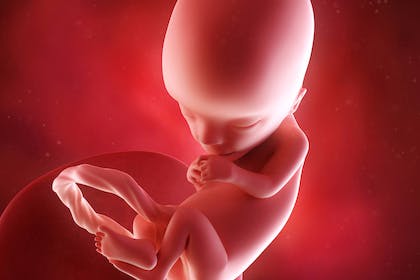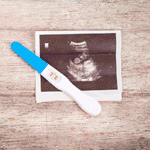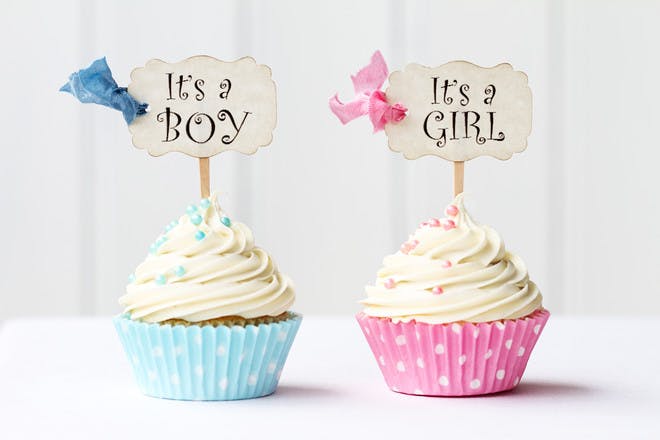Your pregnancy: 13 weeks pregnant

This page contains affiliate links, which means we may earn a small amount of money if a reader clicks through and makes a purchase. All our articles and reviews are written independently by the Netmums editorial team.
You've finally reached the start of your second trimester. Here's what to expect now you've made it through the first trimester and are 13 weeks pregnant. You may even be enjoying having some energy for the first time in a while, too!
What's happening at 13 weeks?
Here are the key things you can expect from your pregnancy at this stage:
- Your baby's kidneys have started working.
- Changes to your skin and hair.
- Your nuchal scan may take place (if it hasn't already).
- You may have more energy to start doing some exercise.
How big is your baby?
Your baby is about the size of a Lindt chocolate bunny this week.
Your little one is growing well, and is now about 7.4cm from crown to rump, and weighs about 23g. Incredibly, your baby is already practising breathing, drinking, swallowing and peeing.
FREE NEWBORN NAPPIES
Your baby's kidneys start to work around now, so as they swallow the amniotic fluid they're floating around in, they'll be able to wee it out.
All 20 of the milk teeth are present below the gums and your baby's vocal cords are developing, too.
If you're having a girl, she already has more than two million eggs in her ovaries.

What's going on with your body?
You'll probably be feeling like a weight's been lifted now that you're in your second trimester. And it has, because your chance of miscarriage has dropped hugely.

Your pregnancy hormones settle down around now, too, which is why morning sickness should be so much better and could even have disappeared altogether.
Your libido may even return around now, too. It's generally safe to have sex when you're expecting, but there are a few cases where you need to take more care. Learn more about sex during pregnancy.
Of course, your partner may not be as in the mood as you. If he's worried about damaging the baby you can assure him that it's impossible.
Oh, and don’t worry if you don’t feel like getting jiggy with it – that’s perfectly normal, too.
If you’re lucky, you may be about to enter your ‘blooming’ stage of pregnancy where your skin, hair and nails are the best they've ever been. You may notice you don't need to wash your hair as often because it doesn't get greasy or maybe your skin issues (oily patches, breakouts etc) have disappeared.
Not all women notice the blooming stage, though. If you're not, you could always take matters into your own hands and give yourself a glow with these pregnancy beauty pick-me-ups.
You might also notice some other changes in your skin, including darker patches in some areas. This is known as ‘chloasma’, ‘melasma’ or ‘the mask of pregnancy' and up to 70% of pregnant women are thought to get them, although in most cases they’re almost unnoticeable.
If yours are obvious, you may be able to cover them with make-up for now. Don’t worry, though – in the majority of cases the pigmentation fades within a few months of the baby's birth.
If you've had a baby before, you may already have felt those first flutters of your baby moving. But it may be a couple more weeks, or longer if this is your first baby.
What if I don't feel any better?
Don't be too disheartened if you are still experiencing pregnancy symptoms such as nausea. Some women just need a little more time before the first trimester symptoms ease up. As the days pass, you could soon find yourself feeling better.
Unfortunately, some women do experience irritating symptoms throughout their pregnancy. If you're among them, do take up offers of help wherever you find them, and speak to a midwife, doctor or pharmacist for relief from common complaints.
What to expect this week: your nuchal scan
When you're pregnant, there's always a chance that your baby could be born with Down's syndrome, a genetic condition that causes learning disabilities and particular physical characteristics.
As you get older, the chance increases. According to the NHS, a woman who's 20 has about a 1 in 1,500 chance of having a baby with Down's, while a woman who is 40 has a 1 in 100 chance.
Every pregnant woman is offered something called a nuchal translucency (NT) scan, which helps assess the chance of Down's syndrome.
You don't have to have a nuchal scan. But, if you do, it has to be done between 11 and 14 weeks of pregnancy.
You may have had it at the same time as your dating scan (in the last few weeks) but if this was done earlier than 11 weeks, the baby may have been too small for the sonographer to get all the measurements they need, so you may need to have the nuchal scan separately.
Your nuchal scan involves a blood test as well as measuring the fluid at the back of the baby's neck (nuchal translucency) using an ultrasound scan.
You'll receive a letter in the post within a couple of weeks with the test results.
If screening tests show there's a high chance your baby has Down's (ie your results show one in 150 chance or more), you'll talk through your options with your midwife. These might include having further tests such as:
- Non-invasive prenatal testing (NIPT) – a highly accurate screening test that's rolling out on the NHS for women who are at increased risk of having a child with Down’s Syndrome, Edwards’ syndrome or Patau’s syndrome. Because it's a screening test, as with the nuchal translucency test, it can only estimate your chance of having a baby with a chromosomal issue.
- Chorionic villus sampling (CVS) – where a small sample of the placenta is tested, usually during weeks 11-14 of pregnancy.
- Amniocentesis – where a sample of amniotic fluid is tested, usually during weeks 15-20 of pregnancy.
CVS and amniocentesis can tell you for certain whether your baby has Down's syndrome. However, the tests themselves carry a small risk of miscarriage. Your midwife should explain all the risks and benefits and help you decide which tests to have, and how to deal with the results.
Find out more about the nuchal scan here.
If you've received your results and it's not good news, it's always a good idea to seek some counselling. Your midwife can point you to services near you.
What to do this week: exercise
If your energy levels have finally returned, now is a good time to start moving more – for you and your baby.
Research by the Royal College of Midwives (RCM) shows that exercise is hugely beneficial in pregnancy. It can help prevent complications such as pre-eclampsia and gestational diabetes, and also lowers your risk of needing a caesarean or having a baby with low birthweight.
Exercise is also a great way to protect your mental health, with research suggesting it can be as effective as talking therapies or medication for relieving anxiety and depression.
It will also stand you in good stead after the baby has arrived – a time when you’ll be thankful for any additional stamina!
The important thing is not to overdo it – so if it’s been a while, keep things low key. If, however, you have been used to exercising regularly, you can keep up a certain level of fitness for now.
It can be helpful to join a pregnancy-specific exercise class, so that you know anything you do will be suitable.
Sports and activities that are ideal for pregnant women include:
- swimming
- walking
- dancing
- aquanatal classes
- pregnancy pilates
- pregnancy yoga
Make sure you read our dos and don'ts before you start exercising during pregnancy:
- Do take notice of what your body’s telling you. You may become dizzy or exhausted if you do too much. Later in pregnancy you’re more at risk of losing your balance as your bump grows.
- Do avoid contact sports and any activity with a potential for falling, such as horse riding, judo, cycling, squash or skiing.
- Do seek medical advice if you notice any vaginal bleeding, shortness of breath, palpitations or pain in your back or pelvis.
- Don’t overheat.
- Don’t exercise flat on your back, particularly after 16 weeks, because your bump will compress a major blood vessel, reducing circulation and making you feel faint.
Seek advice from your doctor or midwife before you start exercising if:
- you're expecting twins or more
- you have a history of premature labour or pre-term rupture of membranes
- you have experienced any bleeding in pregnancy or placenta praevia
- you are experiencing muscle, joint or back pain
- you have any medical conditions or high blood pressure
Your 13 week to-do list
1 Book a holiday – if you fancy getting away before the baby comes, you can fly until you're 37 weeks pregnant (32 weeks with twins) so make sure you don't leave it too late.
2 Invest in a SPF for your skin – your skin is more sensitive to the sun during pregnancy, so wearing a daily SPF30 on your face can help prevent pigmentation occurring.
3 You can stop taking folic acid if you like – although it won't do you any harm if you're taking it as part of a multivitamin, your baby's neural tube will have closed so it's not necessary to take folic acid once you're in the second trimester. It's recommended that you continue to take vitamin D (10 micrograms daily) throughout pregnancy and breastfeeding.
4 Book or confirm your next midwife appointment – this should take place when you're 16 weeks pregnant.
5 Think about where you want to give birth. It's still a long way off, but there's lots to learn to help you make the best decision for you and your baby. Ask your midwife what's available near you, and consider booking a visit to look round the local maternity ward or birth centre, so you'll know exactly what to expect.
What to watch this week...
Get expert tips on what to expect at 13 weeks pregnant from our midwife.
What happens next week...
Want to know what happens when you're 14 weeks pregnant? Or remind yourself what you read last week? Click on the numbers above to find out more about what to expect when you're that number of weeks pregnant.




